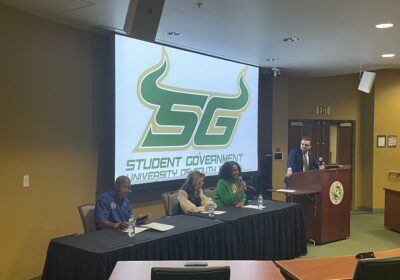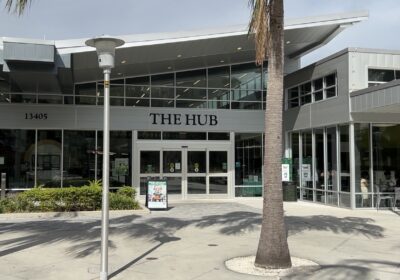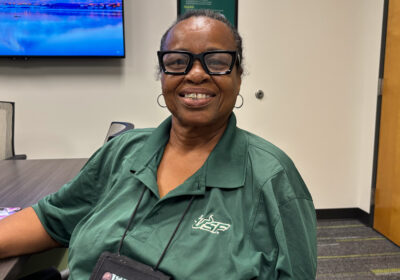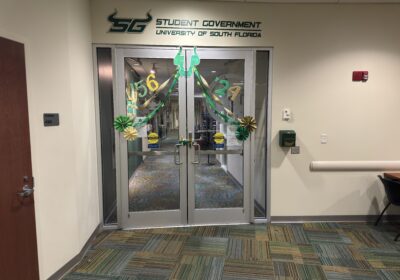Facilities Management completes check of 600 air handlers, budget to fix at-risk units uncertain

When the pandemic began in March 2020, USF Facilities Management started an evaluation of over 600 air-handling, conditioning and filtering units across all campuses. Now, it’s in the process of replacing 76 units that didn’t fit its standards.
While Facilities Management staff checked for issues related to heating and cooling, it was also looking for the quality of ventilation for each unit, as that was a concern of the university due to the airborne transmission of coronavirus, according to Steve Lafferty, director of design and construction at USF.
The team has already replaced 60 units that were in the worst condition, but funding has come into question, according to Lafferty, because deferred maintenance, which consists of heating, ventilation and air-conditioning (HVAC) units, roofs, plumbing, electricity and other building functions, hasn’t been funded since the division received $250 million from the state in 2019.
“The challenge is the state of Florida has really cut back the funding for deferred maintenance and operational maintenance for the university. So, where we did have a program to go through and replace units on a regular basis, we’ve really had to cut that back in the recent few years, because the state funding has cut our maintenance dollars,” Lafferty said.
For the air systems alone, Lafferty projected Facilities Management would need $44 million to make all necessary replacements. Since it hasn’t received more funding, it had to resort to replacing only the units in the worst condition.
“[The low-quality units] will be replaced. Normally we’d like to replace them before they die. If they die, we’ve got to replace them immediately, or do something to keep the air going. So, they will be replaced. ‘When?’ is a good question,” Lafferty said.
The university has already received $34 million in funding from the Coronavirus Aid, Relief and Economic Security Act in April 2020 and $58.2 million from the Coronavirus Response and Relief Supplemental Appropriations Act in March of this year.
Most recently, USF received over $100 million in emergency aid from the American Rescue Plan, but no budget had been finalized as of June 1.
Lafferty put together a budget breakdown at the request of the university in hopes that more maintenance would be funded by these relief funds, but no announcements have been made as of yet and there is no certainty deferred maintenance will receive any of the funds.
The testing of each unit has taken place over the last year, with a team consisting of a licensed mechanical engineer, electrical engineer, civil engineer and project managers on staff.
The American Society of Heating, Refrigerating and Air-Conditioning Engineers (ASHRAE), released this list of recommendations in January. It contains guidance on ventilation, filtration and air cleaning to air distribution and HVAC system operation.
“We had a multidisciplinary team that completed an evaluation across all the buildings on all the campuses to evaluate alignment of the existing systems with a couple documents from the ASHRAE Epidemic Task Force, their core recommendations for reducing airborne infectious aerosol exposure,” Lafferty said.
Once ASHRAE’s list was released, the Facilities Management team added its recommendations to the list of things it checked for, resulting in the team checking for up to 24 components of each of the 600 systems they looked at.
“We looked at factors like the age of the equipment, the condition that it was actually in, the filtration rating, the type of unit that it actually was, what type of controls there actually was,” Lafferty said.
Units were also examined for factors such as airflow measurement, coil configuration, the number of air changes per hour and the size of their motors. The systems were then ranked as excellent, good, moderate or low in terms of overall performance. The 76 units deemed to need replacing fell into the low category.
“Normally these units will last 20 to 25 years,” Lafferty said. “They’re coming to the end where they’ve exceeded the end of their useful life. And we’re either having to keep them together with Band-Aids or just do what we do if we can keep them operating.”
If an air-conditioning system breaks completely, and there is not enough funding for it to be replaced, the buildings will cease operation, according to Senior Vice President for Business and Financial Strategy David Lechner in a presentation at a May 25 Board of Trustees meeting.
Despite the uncertainty of the funding situation, Lafferty was emphatic that the most at-risk filtration systems will be replaced. He said the prevalence of COVID-19 in air in buildings should not be enough to be transmissible.
“The infectious disease experts from both the USF and University of Florida have stated that in nonmedical buildings the potential volume of COVID in the air will not be at a sufficient level to really be carried and spread throughout the air-conditioning systems,” Lafferty said. “That’s actually supported by additional research worldwide by the World Health Organization and by ASHRAE and air-conditioning engineers.”
Though no budget has been decided as of yet, the Facilities Management staff is going to do all it can with what it has.
“We don’t know how much we have to work with, so once we know how much money we have to work with, we’ll start at the top of the list and work our way down until the money runs out,” Lafferty said.
Additional reporting by Audra Nikolajski






